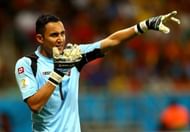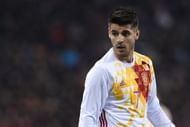The countdown has begun in earnest. Less than a year remains for the commencement of the latest edition of football’s global extravaganza. FIFA World Cup 2018 will start on 14 June and keep us on the edge of our seats for one month with unrivalled entertainment, and the curtains shall be brought down on 15 July.
Meanwhile, the annual summer transfer window is in full swing in Europe. Dominated by Neymar’s mooted world record transfer to PSG, this summer, as with many others, has confounded us with the riches elite football has in store.
Bonucci’s switch to AC Milan, United stealing Lukaku from under Chelsea’s nose, Sanchez’s mind game with Arsenal…….there is no lack of controversies either if that’s what better suits your taste.
So how is the former influencing the latter? In the labyrinths of the complicated world of modern football, how does the anticipation of the upcoming World Cup in Russia affect the thinking of the clubs and their players?
Here we examine how the upcoming FIFA 2018 WC is exerting its influence in shaping up the 2017 transfer window.
#1 Settled players less likely to leave and damage national team prospects

With the World Cup fast approaching, players on fringes of the first team at the national level are anxious to ensure they get consistent first team action. Therefore, even with additional riches on offer elsewhere, they are less likely to accept offers from teams where they are likely to be a squad option.
Julian Brandt of Bayer Leverkusen serves as an example. Amidst interest from Bayern Munich and Liverpool, Brandt has opted to stay at Bayer Leverkusen for at least one more year.
“If you make the move, there is no guarantee that you will play, and I believe that it's important that I get a lot of games next season, and that is a given here at Leverkusen,” said Brandt back in May.
#2 Clubs wait to sell so that price is driven up by WC performances

When it comes to selling a player, the economic considerations are very important. Especially, of course, when it comes to want-away players. Arsenal’s hardline stance regarding Alexis Sanchez is backed up by the simple economics that the profit they would generate if he propels them back to Champions League would far exceed any transfer fee he would currently fetch.
Similarly, clubs are tempted to hold on to their precious assets for at least a year more, with an eye to the upcoming World Cup. Players like Mesut Ozil and Keylor Navas are poster boys for how a good World Cup can be the making of your career.
If a player can fetch a higher transfer fee next summer than this summer plus inflation, why would you sell the player, unbalance your first team and risk tedious efforts to find a replacement?
#3 Players would be reluctant to move to the likes of China and US

It seems so long ago, but less than 24 months back, Chinese clubs were on a shopping spree across Europe. In January 2016, Ramires joined Jiangsu Suning from Chelsea. In February Alex Teixeira followed suit from Shakhtar Donetsk. In December, Oscar and Carlos Tevez joined Shanghai SIPG and Shanghai Shenhua respectively in high profile moves.
Fast forward to 2017, and multi million deals to China are far less common. Of course, the principal reason is that the Chinese government clamped down on such deals.
“To benefit the healthy and steady development of professional football leagues and curb the irrational spending on players, those clubs which are in the red should pay the same sums of money as they are spending on buying players to the Chinese Football Development Fund”, a statement released by the Chinese FA read.
But it would be naïve to suggest that is the only reason – clubs were still ready to part with millions to sign up Wayne Rooney for instance. Rooney, motivated by national team considerations as much as his Evertonian background, turned down such a move.
A move to China or US takes a hard hit on the visibility of a player for a national team manager. Expect to hear fewer and fewer rumours of hefty Chinese paydays – atleast over the next 12 months or so.
#4 Players on the fringes of the first team would want regular action ahead of WC

As we explained in the first slide, players would be averse to risk a detour to unfamiliar landscapes where a settling in period might be inevitable. The same point would be true in reverse as well – players who were previously content with occasional cameos off the bench would suddenly start making noises about regular football.
Alvaro Morata’s eventual departure might have been inevitable, but it is clear he needed to leave now to take centre stage at a European powerhouse before 2018 WC. Joe Hart and Wayne Rooney couldn’t wait around any longer. Giroud might have chosen to stay and fight for his place any other year, but it seems less likely this summer.
#5 Scouts dispatched and ready

At any point of time, clubs are just as concerned with addressing their long term needs as with their short term needs. While you clamour for your favourite team to sign the mercurial winger they are desperately short of, they might already be planning for life without their current star midfielder. Scouts around the world make their name and money on such finds. It is precisely why Everton’s recruitment of Steve Walsh from Leicester made as many headlines as any major player transfer.
With an all star global talent show at the ready, clubs might choose to hold off addressing their long term concerns for just a while longer. Rather than assembling an expensive scouting team to be dispatched to over 150 countries, the World Cup distils these precocious talents down to the best of the best.
Expect several gems to be unearthed – and several mooted needs in 2017 to be held off and realized later in 2018.
